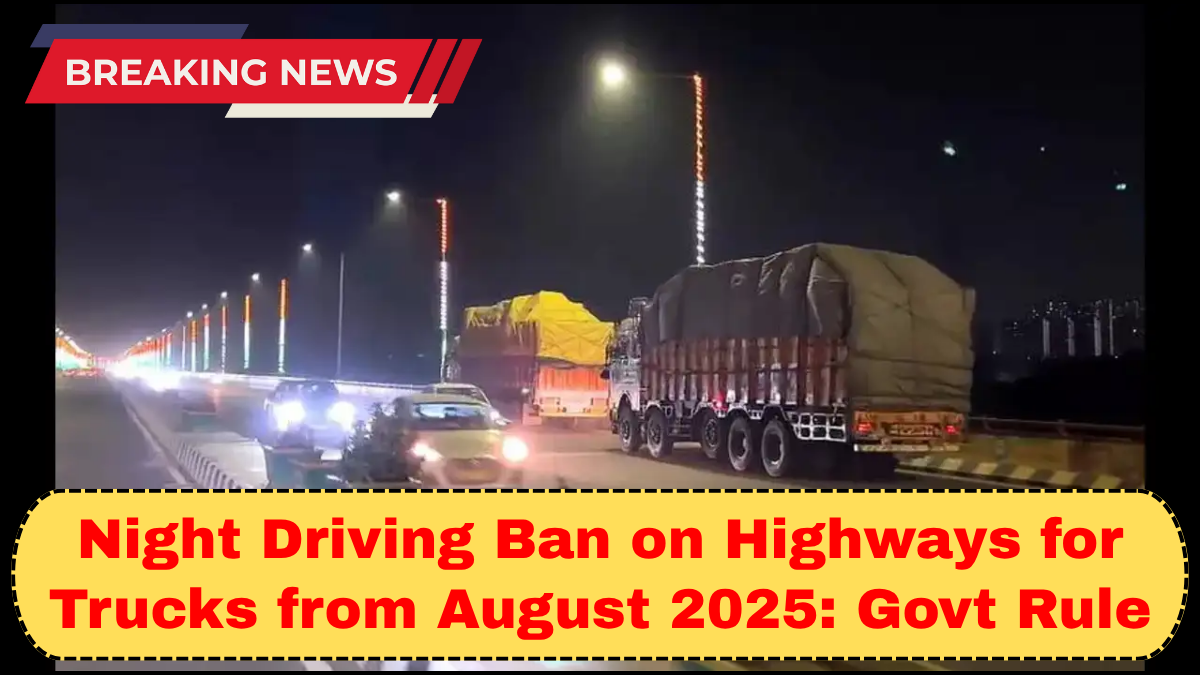In a significant move to enhance road safety, the Indian government has announced a night driving ban on highways for trucks, effective from August 2025. This decision, part of the broader new highway safety rules India, aims to reduce the high incidence of fatal accidents involving heavy vehicles during nighttime hours.

Why the Ban? A Look at the Data
According to data from the Ministry of Road Transport and Highways (MoRTH), a substantial percentage of highway accidents—particularly those resulting in fatalities—occur between 9 PM and 6 AM. Fatigue, low visibility, and reckless driving behavior are key contributors. Heavy trucks, due to their size and weight, pose a greater risk during night travel, especially when drivers are sleep-deprived or under time pressure.
The night driving ban news has generated nationwide attention because it marks a shift in how authorities are tackling one of India’s most pressing public safety issues: road deaths. India records more than 150,000 road fatalities every year, and trucks are involved in nearly 25% of these incidents.
Key Provisions of the New Rule
The Ministry has issued a detailed framework to implement the restriction:
- Timing: The ban will apply from 9:00 PM to 6:00 AM daily.
- Scope: It will be enforced on all national and state highways.
- Exemptions: Emergency services, essential goods carriers (such as fuel and perishables), and government vehicles will be exempt.
- Penalties: Violations will attract hefty fines, license suspension, and possible vehicle impoundment.
Implementation Strategy
To ensure a smooth rollout, the government plans to implement the ban in phases:
- Awareness Campaigns: Leading up to August 2025, targeted awareness drives will educate truck operators, logistics firms, and highway patrol units.
- Infrastructure Support: Designated truck lay-bys and rest areas will be upgraded along major corridors to accommodate parked vehicles overnight.
- Technology Integration: GPS tracking and automated toll monitoring will help identify and penalize violators.
- Coordination with State Authorities: The success of this rule depends on collaboration between central and state transport departments for unified enforcement.
Industry Reactions and Concerns
The logistics industry has expressed concerns about potential delivery delays and cost implications. Many small fleet operators fear loss of business due to limited delivery hours. However, the government maintains that the safety benefits outweigh the operational hurdles and has proposed incentives such as toll discounts and increased daytime freight capacity to offset the impact.
Some companies are already exploring workarounds, including:
- Staggered shift planning
- Daytime logistics optimization
- Investments in route planning software
Potential Benefits of the Ban
- Reduced Accidents: With fewer trucks on the road at night, collision rates are expected to decline significantly.
- Improved Driver Health: Better rest and regulated hours can reduce driver fatigue.
- Streamlined Traffic: Daytime traffic flow can become more predictable and manageable.
- Environmental Gains: Less night-time driving could reduce emissions from idling and harsh driving patterns common in low-visibility conditions.
Future Outlook
The night driving ban news may well become a blueprint for broader regulatory reforms in India’s transportation sector. The focus is now shifting from reactive measures to proactive risk management, aligning with global best practices in road safety.
As India moves to modernize its infrastructure and reduce its staggering road accident rates, the new highway safety rules India are a strong step in the right direction. The government’s resolve to back policy with enforcement and infrastructure upgrades signals a more accountable and safety-conscious era for Indian roadways.
Frequently Asked Questions (FAQs)
Q1: Will the night driving ban apply to all trucks?
No, trucks carrying essential goods, emergency services, and government-authorized vehicles will be exempt from the ban.
Q2: What time will the night driving ban be in effect?
The ban will apply from 9:00 PM to 6:00 AM every day starting August 2025.
Q3: How will this ban be enforced?
Enforcement will include GPS tracking, highway patrols, and automated toll monitoring systems.
Q4: What are the penalties for violating the ban?
Violators may face fines, license suspension, and vehicle impoundment.
Q5: How can logistics companies adapt to this rule?
Companies can shift operations to daytime hours, use route optimization tools, and coordinate with clients to reschedule delivery timelines.
Q6: Is this rule permanent?
Yes, but it will be reviewed periodically based on its impact and feedback from stakeholders.
click here to learn more